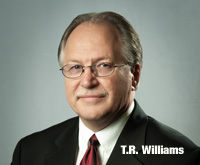Wednesday, September 2, 2015
A Community Problem Calls For A Community Solution
 How do we prevent drug abuse in Lawrence County?
How do we prevent drug abuse in Lawrence County?
That’s the question we’ll begin to tackle, together, at a public meeting set for 5 p.m. Tuesday, September 15 at Lawrenceburg’s City Administration Building.
At that meeting, you can sign up to be part of a new community-wide effort to combat our worsening drug abuse problems. Community Drug Coalitions are making a difference in 52 other Tennessee counties, and I’m convinced we can make a difference here, too.
Coalitions combine the efforts of individuals from all walks of life to battle drug abuse issues on many fronts. Rather than simply react to the problem after the fact, Coalitions take proactive steps to address the factors that lead to drug abuse.
We need a new approach to drug abuse prevention because the problem has taken on new, sinister dimensions. Today’s drug of choice is an opioid painkiller that comes in a prescription bottle. Patients become addicted themselves, and medications are shared, stolen and sold for recreational use. More troubling still, increasing numbers are stepping from prescription opioids to a much more dangerous opioid – heroin.
The U.S. consumes 98.5% of all prescription painkillers produced in the world. Tennessee falls only one-half percentage point behind Alabama, the state that consumes the most opioids in the nation.
Consider these Tennessee statistics:
- Deaths attributable to prescription drug overdose have risen by 220 percent since 1999.
- Emergency room visits for prescription medication-related causes rose by 400 percent between 2005 and 2010 alone.
- Drug-related crimes increased by 33 percent from 2005 to 2012.
- Over the last 10 years, the number of newborn babies suffering from drug dependencies at birth has soared by 1,000 percent.
- In 2008, it is estimated that lost productivity from prescription drug abuse cost the economy an estimated $143 million.
- More than 50 percent of the children removed from their parents by the Department of Children’s Services were taken from moms and/or dads experiencing drug problems.
- If the state were to provide treatment and rehabilitation for every prescription drug addict unable to pay for services, it would cost taxpayers approximately $28 million.
We see the results of increased drug addiction in our own jail, which is overcrowded just five years after its construction. District Attorney Brent Cooper offered a simple explanation at recent committee meeting: “Unfortunately, Lawrence County has a bad drug problem, and that causes people to do things they shouldn’t do.”
Health care for inmates is a huge expense, and many of their issues are a direct result of drug abuse. We also shoulder the expense of drug problems every time we visit a doctor or stay in a hospital because the costs of unpaid treatments are passed along to other consumers.
A recent article in the Tennessean had this to say: “. . . every taxpayer dollar spent on prescription drug abuse prevention programs in the state of Tennessee saves taxpayers, on average, more than four times that much later down the road. That's because the public foots the bill on drug abuse when it comes to paying for prisons and health care.”
After the community-wide meeting September 15, an unpaid executive committee will begin an extensive assessment and planning process for our Coalition. The state recommends that we take plenty of time and care in this step, and then set goals that have measurable outcomes.
In return, the state Department of Mental Health and Substance Abuse Services is investing $50,000 annually in Lawrence County’s Drug Coalition, to cover any costs including the salary of a director.
I am confident that the people of our community can design and carry out a plan that will make an impact on our county’s drug addiction problems. I firmly believe we must act now in order to save as many as possible from a lifetime of slavery to a cruel and destructive master.












 How do we prevent drug abuse in Lawrence County?
How do we prevent drug abuse in Lawrence County?








